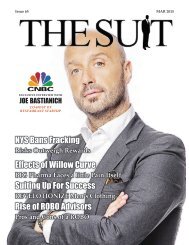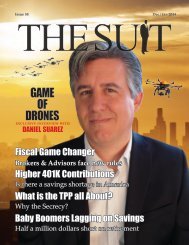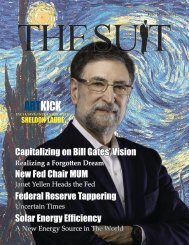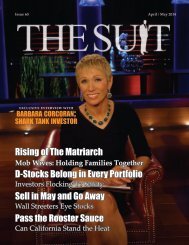o_19grqq7snim9mn019q11f7ds26a.pdf
Marcus Lemonis, a serial entrepreneur and host of the show “The Profit” on CNBC, is a true survivor in the corporate world. The native-born Lebanese business man endured the chaos of a civil war in Beirut and eventually moved to Miami. Lemonis was exposed to the automotive industry throughout his upbringing - his grandfather owning two of the largest Chevrolet dealerships in the United States and Lee Iacocca serving as the family friend and later mentor to Lemonis. On page 12, we conducted an interview with “Profit” host Marcus Lemonis, who offers struggling small businesses capital investment and his expertise in exchange for an ownership stake in the company. In the latter part of the magazine, we interviewed countless wealth advisors during these tough economic times. We recognize that some of the changes in 2013 and 2014 require relevance for financial planners. Therefore, the financial industry continues to push for more realistic standards and reforms.
Marcus Lemonis, a serial entrepreneur and host of the show “The Profit” on CNBC, is a true survivor in the corporate world. The native-born Lebanese business man endured the chaos of a civil war in Beirut and eventually moved to Miami. Lemonis was exposed to the automotive industry throughout his upbringing - his grandfather owning two of the largest Chevrolet dealerships in the United States and Lee Iacocca serving as the family friend and later mentor to Lemonis. On page 12, we conducted an interview with “Profit” host Marcus Lemonis, who offers struggling small businesses capital investment and his expertise in exchange for an ownership stake in the company. In the latter part of the magazine, we interviewed countless wealth advisors during these tough economic times. We recognize that some of the changes in 2013 and 2014 require relevance for financial planners. Therefore, the financial industry continues to push for more realistic standards and reforms.
Create successful ePaper yourself
Turn your PDF publications into a flip-book with our unique Google optimized e-Paper software.
y diane e. alter<br />
Revealing Risk Tolerance<br />
The psychology of risk tolerance is a field many financial advisors more than dabble<br />
in, whether they officially recognize it or not. While these advisors don’t wear white<br />
coats, they do take notes and many do have comfortable couches – or at least cozy<br />
chairs for clients – in their offices. Gauging a client’s willingness or ability to tolerate<br />
risk is a significant skill for any advisor to master.<br />
This is why John S.<br />
Longstaff, CFP®,<br />
one of six partners<br />
with The Planning<br />
Center, supports his<br />
firm’s use of the Australian-based<br />
FinaMetrica’s<br />
Risk Profiling<br />
System. Using 25 questions and psychometrics<br />
developed by the psychology<br />
department at the University of<br />
New South Wales, the system provides<br />
advisors and their investing clients<br />
with a scientific analysis of a client’s<br />
personal financial risk tolerance.<br />
“This isn’t necessarily about how<br />
much of their portfolio is in stocks or<br />
bonds, or how putting 60 percent of<br />
their investments in stocks and 40 percent<br />
in bonds will affect them,” Longstaff<br />
explains. “This is about assessing<br />
ahead of time how they deal with risk<br />
and its potential consequences.”<br />
According to Longstaff, each individual’s<br />
tolerance of risk is directly related<br />
to their money history. He gives<br />
the example of seating ten people<br />
around a table and placing a $100 bill<br />
in the middle of the table. “Each person,”<br />
Longstaff said, “will have a distinctly<br />
unique reaction to that $100 bill.<br />
One might say that his father used to<br />
light his cigars with a $100 bill. Another<br />
may say that they never even saw a<br />
$100 bill until they were age 40.” Those<br />
two examples may represent drastically<br />
divergent abilities for tolerating<br />
risk when it comes to their individual<br />
money history. They can also represent<br />
different and potentially destructive<br />
behaviors regarding the management<br />
of that money.<br />
“We attempt to assess for any destructive<br />
behaviors up front. Then in<br />
the consultative process, we work with<br />
that client to change those behaviors.<br />
They need to be willing to change –or<br />
at a minimum acknowledge – these<br />
said behaviors .”<br />
Armed with the evaluation of a client’s<br />
money history, Longstaff and his<br />
associates are better able to deal with<br />
the inevitable jitters that may arise in<br />
various clients when turbulence in the<br />
market makes it jump to peaks and<br />
drop to lows.<br />
This also helps when the evening<br />
news makes a high-speed, low altitude<br />
pass reporting market movement<br />
without giving any specifics or analysis<br />
of what the activity really means.<br />
“The news anchors get on television<br />
and tell the viewers things such as, ‘Everyone<br />
who has a 401k in the United<br />
States lost X amount today,’” Longstaff<br />
said. “It isn’t accurate and it causes un-<br />
THE SUIT MAGAZINE - JULY 2014










